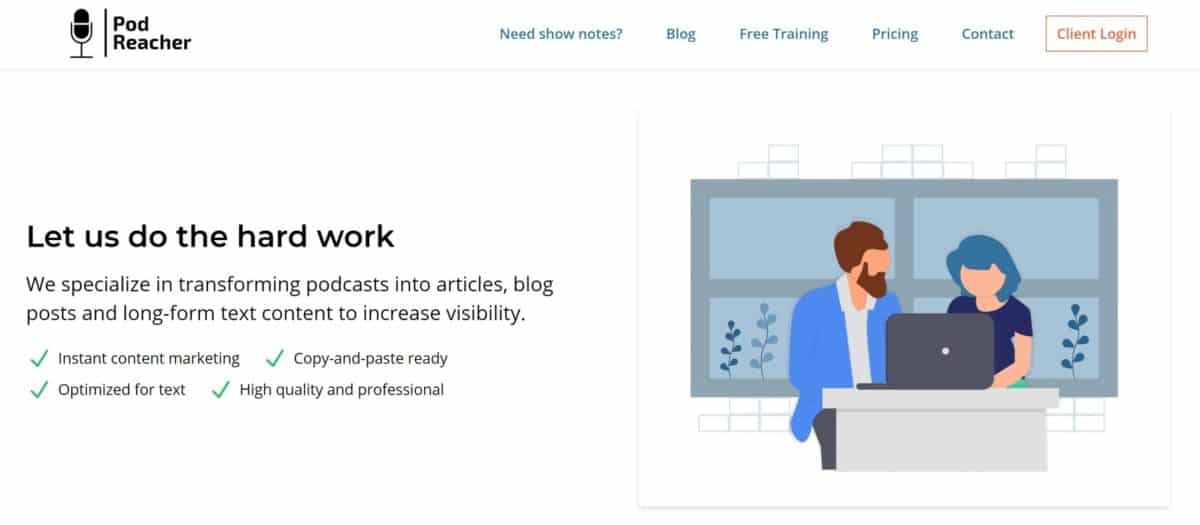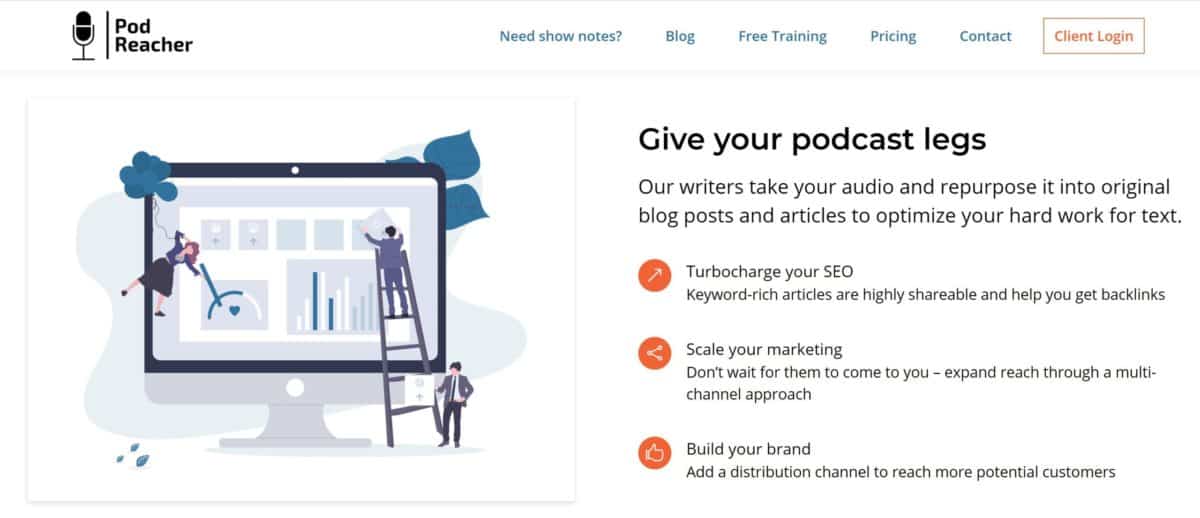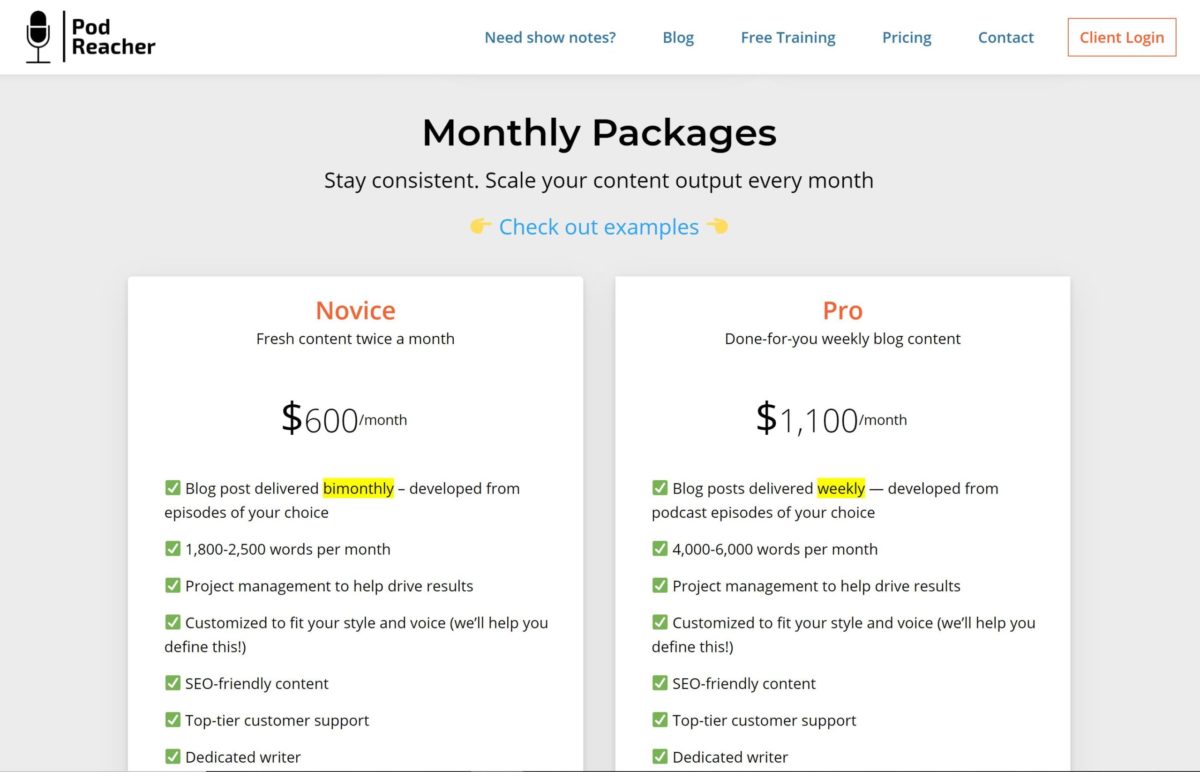This Podcaster Was First-Mover on a $600 Service. Here’s How It Went
Our readers always come first
The content on DollarSprout includes links to our advertising partners. When you read our content and click on one of our partners’ links, and then decide to complete an offer — whether it’s downloading an app, opening an account, or some other action — we may earn a commission from that advertiser, at no extra cost to you.
Our ultimate goal is to educate and inform, not lure you into signing up for certain offers. Compensation from our partners may impact what products we cover and where they appear on the site, but does not have any impact on the objectivity of our reviews or advice.
Improving an existing idea is a common business-launch strategy, but finding an unexposed area of opportunity can take things to a new level. See how one entrepreneur blew the door wide open on an untouched market.

In 2018, content strategist and marketing consultant Jaclyn Schiff spun her marketing expertise into a valuable service no one else specialized in: business podcast repurposing.
Her company, PodReacher, has been growing since, helping small businesses and entrepreneurs turn podcast episodes into blog posts for their websites.
About two years earlier, Schiff left her marketing job with a healthcare trade publication and stumbled into self-employment as a freelance content strategist and marketer.
“I sort of left that job without a plan,” she said. “My plan, if anything, was to freelance while looking for another job.”
Luckily, she never had to find that job. After a few months of freelancing, she picked up two long-term clients on retainer. She sold most of her stuff, moved out of her place in Chicago, and traveled, working as a digital nomad.
“I was super grateful for the work I was doing, but it wasn’t what I saw myself doing in the long term,” she said. “It paid the bills, but I knew I had been itching to start a business that was more than just me.”
Finding the Right Opportunity
Schiff had followed the podcasting industry for a while, but she’d never done the kind of work she eventually based PodReacher on.
Popular podcasts repurposed episodes to create articles for their websites, among other marketing efforts. The tactic attracted Schiff in part because of her journalism background.

“That’s the foundation of the way you would create an article [as a reporter],” she said. “It’s people having an interview and then distilling the most interesting parts.”
Some content marketing agencies offered the service, but no one specialized in it. That was Schiff’s opening.
Her next step was to pitch the idea to podcasts she thought would be a good fit.
She chose podcasts she enjoyed, targeting some that seemed fun to work with and others that seemed like they could benefit from the service.
Of her first 10 or so cold pitches, she got “warm responses” from about six, and two became clients. That was the validation she needed to go all in.
Niching Down the Business
At first, she treated the business as a side hustle, still freelancing full time as a marketing consultant. For about six months, she put any money she earned back into the business.
She also spent that time honing the service and clearly defining PodReacher’s niche. She’d originally pitched podcasts spanning genres but quickly noticed business podcasts with a marketing budget were her best opportunity.
Over time, Schiff narrowed her service offering, too. PodReacher used to write show notes and edit transcripts in addition to repurposing episodes into articles.
“I originally thought edited transcripts would be a lot more popular,” she said. “And there was virtually no response to that.”
After just a few months of pitching and working with clients, Schiff realized her highest-value service was turning podcast episodes into blog articles.
PodReacher now occasionally experiments with other services, but the focus is almost entirely on repurposing podcast episodes into blog articles for business podcasts.

Schiff is so focused on this core service that she’ll turn down potential clients willing to pay for other marketing work. This tactic may sound scary to a budding entrepreneur, but it has benefits.
Even though it’s hard to turn down paying clients, she knows staying focused is the right move for her business. She thinks honing in on one service and becoming the best at it will give her an advantage in the long run.
Selling a Niche Service: Treat It Like a Product
One of the greatest benefits of narrowly defining your service, PodReacher’s model demonstrates, is that it simplifies how you sell it.
As a freelancer, you can spend a lot of time talking with prospects about their needs, customizing proposals to demonstrate how you’ll best fulfill those needs, and negotiating rates for your services.
When you clearly define your service before having that conversation, it’s a lot simpler to determine whether you’re a fit for each other.
This model is called “productizing,” a method of selling your services the way you would products — a predetermined offering for a pre-set price. On PodReacher’s home page, podcasters can see an outline of the episode-repurposing service and pricing for a monthly subscription or single article.

“I was very interested in the productized service model,” Schiff said, so she intentionally designed her business to use it.
The potential drawback to productizing a service is giving up your ability to charge higher rates to clients with bigger budgets. PodReacher works with some companies that have marketing budgets in the hundreds of thousands or millions of dollars. It also has clients with four-figure budgets. All pay the same rate.
It can be frustrating knowing she could charge some businesses more and doesn’t, but she still believes productizing is the better option.
“I think for people that do well in business, it’s not just about getting the most money you can from a single client,” Schiff said.
Saying ‘No’ to Work Outside of Your Scope
Freelance-style client work can grow in scope easily, and freelancers often find themselves renegotiating with clients or regularly steering them back on track to avoid doing extra work they never agreed to.
Productizing, on the other hand, helps you create clear boundaries around what you offer.
“It easily gives you clarity on what you offer and what you don’t, on what you say ‘yes’ to and what you say ‘no’ to,” she said.
Turning work down continues to be a challenge for Schiff, almost two years into the business. But she’s learned from years of following business podcasts that specialization pays off.
The key — as with a lot of business decisions you’ll make — is to take your emotion out of it and choose work and clients rationally.
When a client or prospect asks to hire her for work outside of PodReacher’s scope, Schiff takes a beat.
“I try to not respond [right away],” she said. “I give it time, because I know, emotionally, it’s hard to say no, because I want more work, more revenue. If I give it time, I give time for the intellectual side to kick in.”
That extra space usually reminds Schiff that accepting a larger scope of work hasn’t turned out well in the past, and it becomes easier to reiterate the boundaries of her services.
Related: 47 Small-Scale Business Ideas You Can Start Today
Getting Clients in the Door
When you provide a service no one else offers — and many clients haven’t even heard of — how do you convince anyone to pay you for it?
Offer samples
The simplest way is to let them sample the service. It’s one of many marketing tactics for business owners — a short free call with a coach, free consultations with a chiropractor, free samples of food in the mall food court.
PodReacher offers a discounted first article for prospects. If they want to continue, they can sign up for subscription billing or buy additional articles a la carte.
“Once people see an article, the conversion rate is high,” Schiff said. “So if we get to that point in the discussion, they see the article, they see also that it takes no work on their side and that we produce something really good…they want to move forward.”
Demonstrate the demand
One hurdle you may have to overcome when you’re the only one offering your specialty is prospects assuming there’s no need for it.
PodReacher prospects sometimes wonder why no one else specializes in podcast repurposing. Doesn’t that mean the market doesn’t exist?
In response, Schiff points out that she has seen a demand for the service. People request podcast repurposing on freelancer platforms like Upwork, and some content marketing agencies provide the service to their clients — she’s just the first to offer a premium service in the niche.
Arm yourself with examples of others looking for a service like yours to show prospects you’re not pulling ideas out of thin air.
Related: 20 Best Small Business Ideas for New Women Entrepreneurs
Tie it to hot topics
If people aren’t specifically seeking your service, find a way to demonstrate its value related to the outcomes they want.
For PodReacher, Schiff often talks with prospects about the value of frequent website content for search engine optimization (SEO) — a major marketing buzzword. That connection lets her talk about podcast repurposing using a framework that prospects already understand.
Within that framework, she can explain to them how her service can help them achieve a goal they already have: more website traffic.
Earned media or press also comes more easily with written content than audio. From her perspective as a former journalist, Schiff can say it’s easier for a newsletter or industry publication to write up your podcast when the writer can skim an article for highlights and quotes.
Related: How One Woman Turned Her Financial Crisis Into a Successful Business
Show them what they’re missing
Leaning on her experience with content strategy, Schiff can see how podcasts are marketing themselves before she talks with their hosts.
Understanding what prospects already do is important so you can point out what they’re not doing — and how you can fill the gap.
A lot of podcasts PodReacher works with are interview-based. Just a few years ago, a high-profile guest was all you needed to get visibility. But now, Schiff notes, the ubiquity of podcasts makes that strategy ineffective. Guests appear on too many shows to promote them all; you need a special hook.
A blog post, which puts the guest’s name in print and highlights their best moments from the interview, is a strong hook — and Schiff’s clients say it works.
“This can be a differentiator,” Schiff said, “because not every interview podcast is doing it.”
Related: One Expert’s Advice on Why Weird Side Hustles Work (and How to Find One)
Find Where Your Unique Strengths Meet a Need
If you’re looking for inspiration to start your own business, pay attention to what you’re interested in and stay open to changing course. Schiff developed her business idea after pivoting from her original plan to earn an MBA. She didn’t think the cost of the degree would pay off down the line.
“I didn’t go to grad school,” she said, “but I listened to business podcasts, a lot of them.” That free education helped her recognize a business opportunity when she saw it.
Her story demonstrates that it doesn’t take a revolutionary idea to build a successful business. You just need to find where your strengths align with a need in the market.
That intersection is where many successful business ideas, like PodReacher, are born.
Disclosure: The author has worked as a freelancer for PodReacher. This profile was created independently for DollarSprout without direction from PodReacher.







